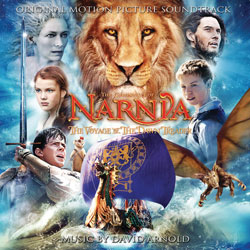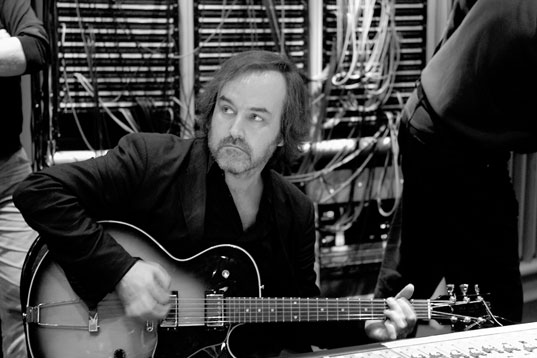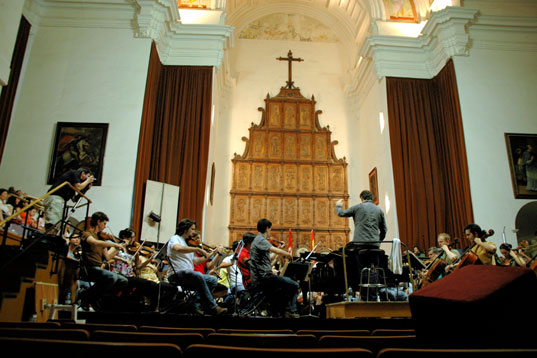
THE CHRONICLES OF NARNIA: VOYAGE OF THE DAWN TREADER, SOUNDTRACK SCORE (CD)
Release date: December 6th 2010
Running time: 72:05 minutes
Composer: David Arnold
David Arnold, the Grammy Award winning composer who has scored five James Bond movies, as well as Independence Day (1996) and Stargate (1994) joins us for an exclusive chat about his work on Narnia: The Voyage of the Dawn Treader.
This is the fourth time Arnold has worked with director Michael Apted. They previously worked together on The World Is Not Enough (1999), Enough (2002) and Amazing Grace (2006).

STATIC MASS: How familiar were you with the world of Narnia before Michael asked you to score the film?
DAVID ARNOLD: I’d seen the previous movies when they came out in the theatres, but I hadn’t watched them since. I read the books when I was very, very young. I remember reading the first three and not really getting beyond that. But when he asked me to do it I re-read the entire series just to re-immerse myself in that world because I know it’s a world that involves a very spiritual aspect so I didn’t want to be coming into this thing thinking you can just do what you want. You have to be duly respectful of the source material and also of the work that had gone before.
The key thing was returning to the magic and putting the magic back from the first one more than the second one. Rather than going back and watching the films again, I kind of revisited that world in my imagination as I had done when I was really young and that music appeared to me and as it occurred to me from the book. I thought that’s probably a good place to come from because that’s where the heart of the thing is, in the actual text.
Themes from Harry Gregson-Williams’ first two Narnia scores for The Lion, the Witch and the Wardrobe (2005) and Prince Caspian (2008) where incorporated into the score for Voyage of the Dawn Treader, so the movies have a theme which connects them all.
STATIC MASS: Was this a decision made quite early on, that the films would be connected, despite a change in director and studio?
DAVID ARNOLD: I’m not sure if anyone expected me to do it. Someone asked me if I was going to do it and I always fully expected to do it because this isn’t a series of films that is old, it’s a fairly recent phenomenon and I think to establish a template and a blueprint of what the music should be, Harry had done all of that.
It would have been churlish or ignorant to abandon those ideas that people had used so well in the first two films. I wanted it to feel like part of a series, rather than just a complete stand-alone story, although the story is completely different to the others.
We’re not really in Narnia beyond the first five minutes and when they arrive, even then, they’re sailing away from Narnia and going somewhere else. I thought we could bookend the film with Harry’s music, which I thought would be a nice way to do it because once we actually start off on the journey with the Dawn Treader itself we go to all these different places we’d never been before so it made sense to write new music because a) for the Dawn Treader, b) for all these new places they’re going to and c) the situations they encounter. They are completely different to the others.
TRACK LIST:
1. Opening Titles
2. The Painting
3. High King and Queen of Narnia
4. Reepicheep
5. Land Ahoy
6. The Lone Island
7. Lord Bern
8. The Green Mist
9. Market Forces
10. 1st Sword
11. Eustace on Deck
12. Duel
13. The Magician’s Island
14. Lucy and The Invisible Mansion
15. Coriakin and the Map
16. Temptation of Lucy
17. Aslan Appears
18. The Golden Cavern
19. Temptation of Edmund
20. Dragon’s Treasure
21. Dragon Attack
22. Under the Stars
23. Blue Star
24. Aslan’s Table
25. Liliandil and the Dark Island
26. The Calm Before the Storm
27. Into Battle
28. Sweet Water
29. Ship to Shore
30. Time to Go Home
Although the film is presented in 3D, it was filmed in 2D and then converted. Arnold only got to see the finished result when he attended one of the premieres. Scenes where the sea serpent emerges out of the water and attacks the Dawn Treader not only look amazing because of the depth the conversion gives it, but it sounds incredible as it balances the score and sound effects seamlessly.
STATIC MASS: The score, along with the overall sound design both work very well in the film. How did you go about balancing the two?
DAVID ARNOLD: We took a lot of time and trouble trying to make that happen in an emotional as well as a visceral sense. Part of it is obviously the really sophisticated sound systems nowadays and part of it is in the dynamics. The whole sea Serpent sequence is so loud, we were loud through some of it but not all of it. Hopefully you had a feeling when you needed to feel a bit more than be shocked by something, in a visceral way music would play. If it was a visceral shock then there would be a scream or a roar or a shout or a sound of breaking wood, or the ship crashing about on the ocean.
I thought it was a reasonably good balance of music and effects and I tried to be aware of what the effects were doing and work alongside what the effects guys were doing as well. When they had temps of work they were doing, they would turn them to me so I could write alongside the sound effects. So I knew when the sound effects we going to be louder there would be no point in me joining alongside them.
For this score, Arnold worked with an 87-piece orchestra, a 40-piece choir and was also joined in the studio by Michael’s son, Paul Apted for the editing. But before any of the editing or recording takes place, there’s an awful lot of writing to get done.
STATIC MASS: Were the core pieces written before work with the orchestra started?
DAVID ARNOLD: It was a 90 day process, writing and recording the music for this film. The actual recording process was only 10 days so there was 80 days of writing and preparation, then 10 days of recording. No one sees the music until the orchestra turns up. The first time they play it is the first time they see it. Five minutes later it’s rehearsed and recorded. It’s an extraordinary testament to the talent of these musicians really. You don’t have the luxury of trying things out with them because it all costs money. You have to do all that beforehand.
When you listen to the score, either on its own or in the movie, you will hear it moving from angelic chorals to more dramatic moments quite often. These changes reflect the conflicts each character faces.
STATIC MASS: It’s a hard task isn’t it, to find musicians who can tell all these different parts of a story in a short space of time?
DAVID ARNOLD: What you find at this level is that the standard of musicians is so high; these are musicians who might be playing Narnia with me during the day and then going out and doing Beethoven or playing at Ronnie Scotts or playing in the West End in the evenings. Then the next morning they might do a jingle for a coffee commercial and then they’ll come in and record some score for another film.
Like good actors, they can adapt to pretty much anything. I think it also comes down to the writing. If you put the right notes in front of them they will certainly make them sound the way you want them to sound.
When they rehearsed onto a recording there are things you discuss with them about the tone, the feel of the piece and what you’re trying to achieve emotionally. They’ll respond to that as much as they will notes about mechanics, the dynamics of a piece and harmony. I thought they did a fantastic job, considering they don’t get to see the music until the day when it’s put in front of them when we’re recording it, which is an amazing thing. That’s why I love recording in London, that’s where the talent is, that supreme A-list, nothing’s a problem.
One thing is for sure though; Narnia with its music takes you to a magical place beyond your wildest dreams if you are of noble heart and mind. What Arnold has been able to do comes from working tirelessly and passionately. With that, we ask him one last question.
STATIC MASS: As this is all about Narnia, what would your magical world be like?
DAVID ARNOLD: This year I’ve done four films and two TV shows, I’ve done a video game. I’ve done a theme tune for Ben Stiller for his mum and dad for their online little comedy film! I’ve had six days off for the past year so at the moment my magical place would be my front room with the curtains drawn watching some endless cookery program with the phone not ringing!
Next up for Arnold fans is the soundtrack for the comedy adventure Paul starring Simon Pegg, Nick Frost, Jason Bateman, Sigourney Weaver and Seth Rogen as the voice of Paul which he was working on at the time of this interview.
Each week we take one scene from a movie and deconstruct it to reveal what kind of an impact they’ve had historically and culturally and what they say about us as a society.
Albert Einstein, the father of modern physics, is the focus of this 60 minute documentary. It takes a close look at his amazing life, achievements and his legacy.
Featuring interviews with Gullermo Del Torro and John Carpenter, Lovecraft’s life and career are the topics of discussion in this feature length documentary.
The Wild Hunt is a heart-pounding thriller with violent sequences of savagery and a proveiling Shakespearean style tragedy throughout. The ending is gruesome yet quick.
We caught up with writer and director Reg Traviss for a chat about Psychosis, working with Charisma Carpenter and his love for British horror films.





































































